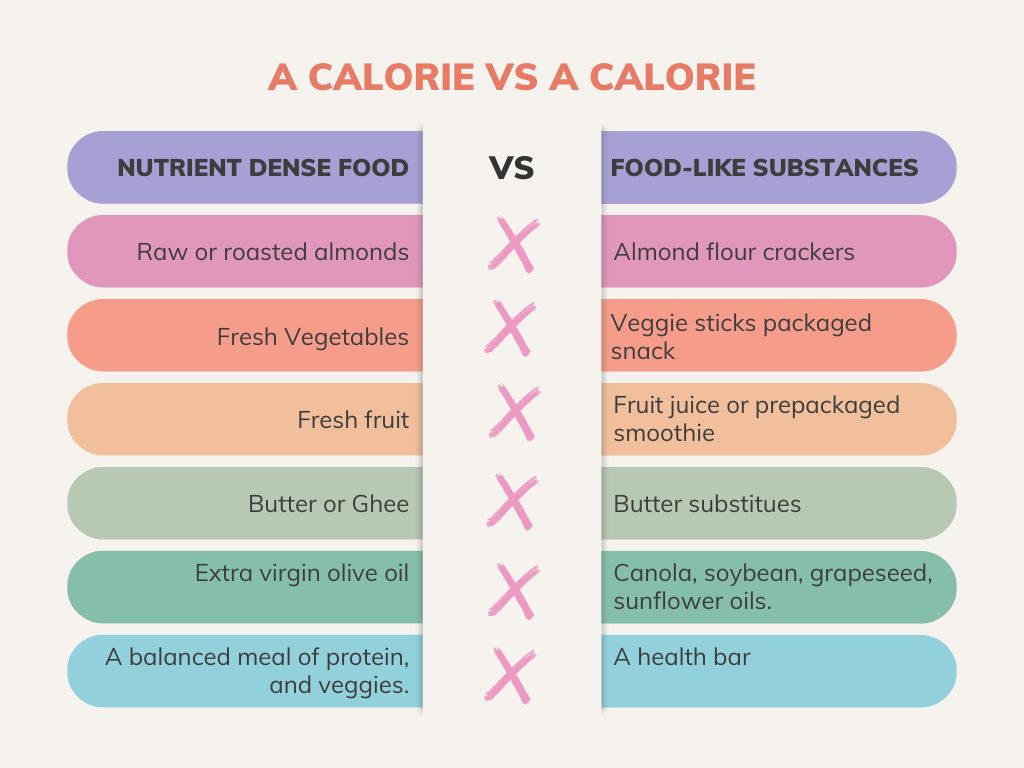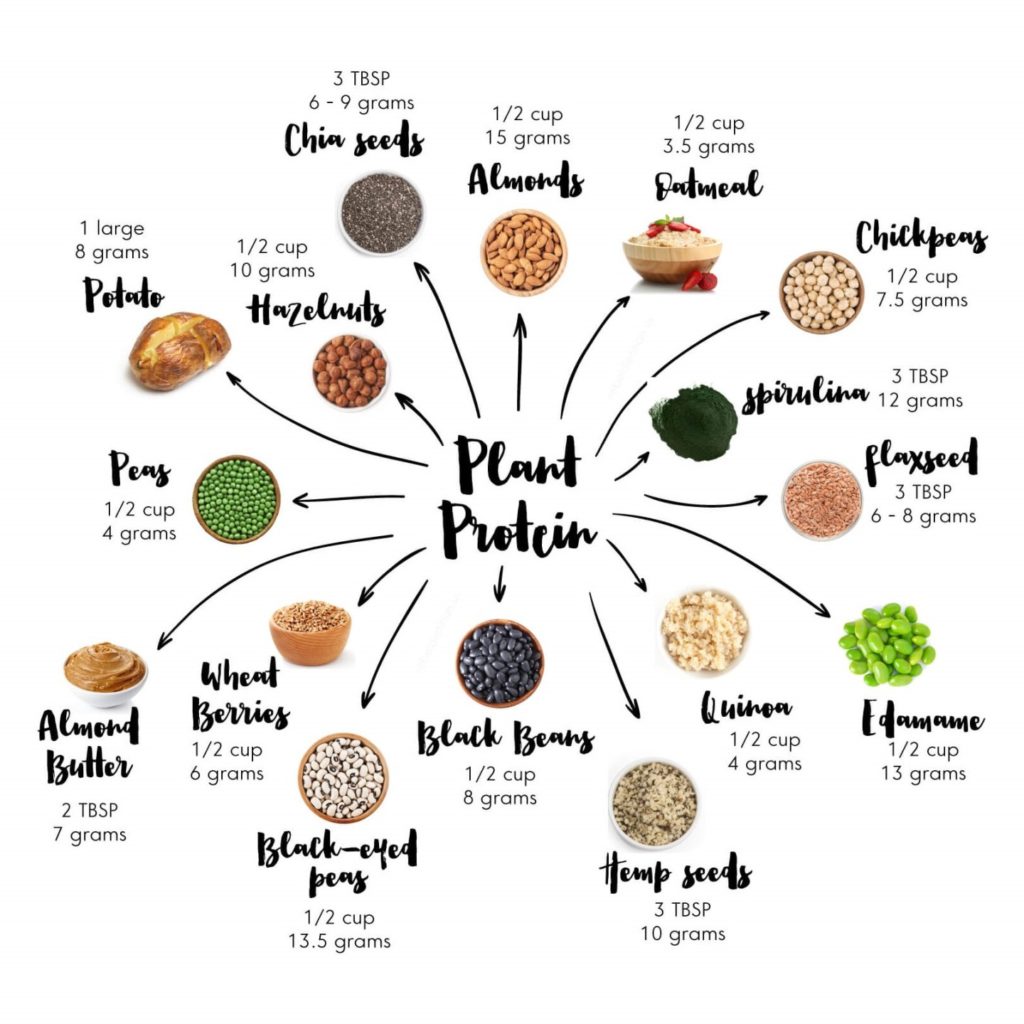I’m sure you have heard of the saying, “All calories are the same”. This myth is just NOT true and we are going to break it down today into the simplest terms, and uncover why some people lose weight and for others the weight won’t budge.
“The conventional wisdom doesn’t stack up against the emerging research that shows us that a calorie is not a calorie (when you eat it). In a vacuum or a lab, calories from all foods release the same amount of energy when burned—whether the food is coconut oil or honey. But when you eat, foods have to go through your body, and they can have profoundly different effects on your hormones, brain chemistry, and metabolism. Fat calories burn differently than sugar calories do. Fat calories speed up your metabolism. Fats have to be burned and are not easily stored because they don’t spike insulin—the fat storage hormone. Fat works on the brain to cut your appetite so you eat less overall during the day. On the other hand, sugar and carb calories do exactly the opposite: They spike insulin, promote fat storage, and are quickly laid down as dangerous belly and organ fat. They slow your metabolism and increase hunger and cravings. Mounds of scientific research support this perspective.”
Dr. Mark Hyman
Myth-buster #1: My metabolism slows down as I get older.
Your age has NOTHING to do with you not being able to lose weight. Therefore losing weight is actually a science and comes down to the fact that you MUST be calorie deficient in order to lose weight. And exactly what are you eating in that calorie deficit?! Immediately most people will think about just eating less and working out more because this is what our society has drilled into our brains our entire lives.
STOP! Before you go off to deprive or starve, let’s understand how to fuel our bodies with the correct calories. In fact, you will see a healthier weight, feel satisfied and nourished, and I promise you will NOT be hungry. A REAL (this word is important) calorie is much different than a food-like substance calorie.
What is a calorie?
A calorie is a unit of energy. Specifically the amount of energy it takes to raise the temperature of water in the body by one degree.
Probably not what you were thinking right? Our body NEEDS calories to actually function. In other words, all the things going on in our body; cell production, brain activity, pumping blood, movement, digestion, immune system, hormones, liver and kidney function. These ALL need energy to work correctly. Your brain by itself takes up 20% of your calories each day to keep you focused and present.
Think about a time where you were starving, past your meal time. You probably had a hard time focusing, felt tired, hangry, maybe even got a headache. This is your body telling you it needs fuel to energize your body. Calories are not the enemy. They are 100 percent necessary to survive as a healthy human being. BUT it does matter what you are using for calories.
Myth buster #2: Eating less calories will keep me skinny.
If you aren’t eating ENOUGH calories you can actually gain weight. In other words, when you don’t eat enough you actually slow your metabolism down. Your body goes into survival mode and starts breaking down muscle to release the glucose stored inside, which can be used for energy. Because you’re not taking in enough calories, your body slows down your metabolism in an effort to conserve energy. You might feel sluggish and cold and have gastrointestinal abnormalities, such as constipation. Will you get skinnier by not eating enough? Sure. Will you get really sick? Yes, absolutely!! When your body goes into survival mode your immune system is weakened. You will get sick more often, not to mention that over time in survival mode causes enormous stress on your body, and can cause many chronic diseases.
The same goes for overeating calories. Especially if they are empty (kindling energy) caloric foods such as processed, packaged food. Micheal Pollan in his book “In defense of food” says:
“Eat food, not too much, mostly plants.”
Fueling your body with three nutrient dense meals is necessary for survival.
This is where understanding the difference between a calorie is not a calorie is really important and super common mistakes are made. Let’s go over some examples first and then I will explain the simplest way to avoid these mistakes.
Myth buster #3: It is healthy if it says “Organic”, “dairy free”, “Gluten free”, “Sugar Free”, or “Fat free”.

Firstly, let’s compare “Healthy Food”. In this day and age our health food industry tricks us more than the fast food restaurants, more than Starbucks, or your local ice cream shop. We know fast food calories are not the same as eating vegetables. The health food industry unfortunately works off of our weaknesses.
They know we want simple easy fixes to eating healthy. God forbid we have to cut up some fruit, or pack a snack for ourselves or for our children. They also know all the trigger words such as “gluten free” to get us around being deprived of bread and carbs that don’t benefit the body and actually cause harm to our gut. They are masters at marketing to our busy lives.
As shown in the graph above, here are some examples I commonly come across with my clients and also in my own life, especially buying packaged snacks for my child. Secondly, broken down, these packaged foods will NEVER be able to replace what a vegetable, fruit, protein, nuts and seeds can do to support your body.
Calorie, macro, and nutrient comparison.
- Raw almonds vs. Almond flour crackers.
Blue Diamond Whole Raw almonds: (around 24 nuts)
160 Calories. 6g carbs. 14g of fat. 6g of protein.
Simple Mills Almond Flour crackers with sea salt: (17 crackers)
150 calories. 18g carbs. 8g of fat. 3g protein.
2. Fresh Vegetables vs. Veggie sticks.
Slices cucumbers: (as many as you want)
30 calories. 6g carbs. 0 fat. 3g protein. Fiber, Vitamin C,D, and K, and magnesium.
Veggie Sticks: (38 straws)
130 calories. 15g carbs. 7g of fat. Less than 1g of protein. 2% vitamin C.
3. Fresh Fruit vs. pre packaged fruit smoothie.
Banana: (1 medium banana):
105 calories 27 carbs. .04g fat. 1.3g protein. Sugar 14.4.
Naked Fruit smoothie(strawberry banana 15.2oz)
250 calories. 59g carbs. 0 fat. 2g of protein. SUGAR 44g.
TIP: Thirdly, don’t blend your fruit (even at home). Not only does it disrupt the natural fiber and nutrients but our body absorbs the fructose and glucose differently when broken down. A fruit smoothie vs a smoothie with dark leafy greens, good fats (avocado, coconut milk, nut butters), and protein, is not even close in comparison for fuel. Healthy fats and greens beat out fruit with nutrients and it will keep you full of energy for MUCH longer. Think a kindling burning fire, versus a log burning fire.
Lastly, I can honestly compare real food with processed food all day and it still wouldn’t prove the point I am going to tell you now. You will continue to say “well Megan the almond flour is less calories, those almonds have a lot of fat.”.
Read this!! All calories are not the same.
PROCESSED CALORIES are broken down (aka processed). The almond flour used to be almonds and is now broken down, stripped of its nutrients, and modified into a “food-like substance”. Because of its modifications, the food-like substance is nutrient depleted and creates an addictive behavior in our brain because our body is searching for the nutrients that it needs. This causes us to consume more and more of the processed food, which then in turn causes gut problems, obesity, inflammation and eventually ALL chronic illnesses.
“When we want to spot the parties responsible for metabolic disease, we point a finger at the highly processed, sugary foods and sweetened drinks. (We’re looking at you, packaged cakes, candies, cookies, and sodas.) These are the foods and drinks most associated with compulsive eating. They light up the reward system in your brain. They are almost immediately absorbed into the blood, and they trick the brain into thinking we are starving and need more food. While we used to think all nutrients had similar effects on weight and metabolism—a ‘calorie is a calorie’—this is wrong. Simply reducing sugars, even if you eat the same number of calories, can lead to metabolic improvements. Simple carbs wreak more havoc on metabolism and control over appetite than other types of foods.”
Elizabeth Blackburn
Did you know you can actually get enough protein just from plants?
Ok, now that that’s settled. In conclusion, a calorie from nature, anything grown outside, from a tree, in the ground. Animal protein, fish, seeds, and nuts in their original form is REAL food. Carbs are not packaged crackers, they are vegetables and fruit. Fats are not greasy comfort foods, they are dense real foods and the highest fuel we can get. Olive oil is pressed from REAL olives. Coconut milk comes from coconuts. Avocado comes from a tree. Buying meat from grass fed, pasture raised farms keeps it minimally processed with NO added hormones and artificial ingredients. Hint: whatever the animal ate, you will eat.

You can be a vegetarian and still get enough protein just from plants. For instance, Brendon Brazier is an Ironman athlete that is completely vegan! If you don’t know what an Iron Man race is, it is a running marathon, 2.4 mile swim, and a 112 mile bike ride. He eats zero animal protein and gets his protein from plants. Check him out in his book “Thrive”.
Remember no matter what the package says, it is a “food-like substance”, and should not be your main source of calories!!
One of the biggest problems in our society is we all think we know what we are eating. A good old food journal or now much easier in this day and age a food tracking app is going to give you all the data you need. How many calories should we be eating? First find out what you are actually putting into your body right now.
The only way to truly know what your calorie intake and macros are is tracking your food. Myfitnesspal is my favorite and super user friendly. Tracking your food is not about obsessing over weight or food, it is all about getting facts on if you are fueling your body correctly, in addition to what gives you the most energy, and where you can make adjustments.
Knowing what calories to eat can be hard.
Knowing the right calories and macros can be difficult and hard to understand. That’s why this month I am offering FREE one time personal macro and calorie counts.
Check out my blog on calories and macros broken down. Head to my website for your free macro and calorie counts, and get signed up for my weight loss program ASAP. Limited spots are available!! FYI it is SO much more than weight loss, it is about building a sustainable healthy lifestyle that will have you keeping the weight off forever!
Your body is made to be lean, agile, and mobile. Real food, sleep, and movement give us all these things. It doesn’t matter your age, this is the way our bodies are built and how they truly thrive. Eat real food, move throughout the day, and get 8 hours of sleep each night.
Resources:
Food Fix by Mark Hyman
In Defense of Food by Michael Pollan
Blog on supplements and how they don’t replace a healthy diet.
[…] look up places that offer the metabolic test in your area. Learn more about what a calorie is here, hint..it’s not the […]